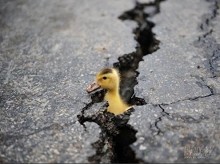记叙文阅读,完成问题。
(1)那一年,天大旱。夏收以后,老天爷就再也没有痛快地下过一场雨。一口一口的池塘被炙烤得快要发疯的乡亲们舀了个底朝天。
(2)当大人焦虑不堪时,孩子却乐不可支,没有什么比得上在快要干涸的池塘里抓鱼来得有趣。山塘里的大鱼小鱼、泥鳅虾米、田螺蚌壳被我们收拾得干干净净。
(3)一个月之后,山塘的淤泥开始硬结发白;两个月后,山塘里硬化的泥土横七竖八地裂成了无数不规则的小块片,裂缝窄的四五公分,宽的有一尺以上。
(4)直到秋收以后,严酷的旱情才有所缓解。过年时下起了大雪,雪化后山塘里终于有了浅浅的一洼碧绿,但清清的浅水中连一只活着的虫子都看不到。
(5)阳春三月,细雨绵绵,山坡上的雨水全注入塘中,山塘中一片浑浊。五六月间,山塘里的水澄澈清亮起来。有一天,我在池塘边溜达时,突然眼前一闪,鱼!一串串小鱼儿在清澈的池水中游弋嬉戏。再仔细一瞧,哟,还有小虾米、小泥鳅呢!
(6)我纳闷了:小鱼儿是从哪钻出来的?这是一口山水塘,没有别的水源呀。于是我跑回家求证大人。父亲说:“有水就有鱼。有什么大惊小怪的。”这回答等于什么也没说。
(7)问母亲。母亲迟疑地说:“说不定是有人放养的吧?”这回答和没说差不多。
(8)问姐姐。姐翻了半天白眼,说:“我知道了,是山上的毛毛虫变的!”这回轮到我翻白眼了。
(9)奶奶听到了,瘪着嘴说:“那是鱼蛋蛋变的。”我说鱼蛋蛋不早就烤干了吗?奶奶说:“那鱼蛋蛋可厉害呢,三年都晒不死的。”
(10)我仍然将信将疑。上初中时,我把这个难题送给了生物老师,生物老师挠了半天下巴,说:“可能是泥块里有存活的鱼卵吧。”
(11)我不再追问。鱼儿一定有一种特殊的延续生命的方式,就像:哪怕是阳光无法透射的深海,也有无数的生物在畅游,抑或是千年的冰层下也有生物在潜滋暗长。
(12)顽强、坚韧、不屈不挠,野火烧不光,干旱炙不死,洪水荡不尽,地震摧不毁……这,就是生命的本质!
(13)很多年过去了,但那山塘中的小生灵的神秘、顽强、执著,常常让我的心房有一种无法形容的悸动,让我时常生出一种对各种生命群体的深深的敬意。(节选自《青年文摘·绿版》2008年第12期,有改动)
1.阅读全文,概括(1)—(3)段的主要内容,并简要说明作者的写作用意。
____________________________________________
2.结合语境,分析下面句中加粗词语的表达效果。。
两个月后,山塘里硬化的泥土横七竖八地裂成了无数不规则的小块片,裂缝窄的四五公分,宽的有一尺以上。
____________________________________________
3.文中画横线的句子运用了什么表达方式?有何作用?
____________________________________________
4.“我”是一个怎样的孩子?这个人物形象在全文的结构中起了怎样的作用?
____________________________________________
5.仔细观察下图,从图中小鸭子的眼睛里你读出了什么?联系选文,谈谈你的感悟。(不超过50字)
____________________________________________

5·12地震中掉入裂缝里的小鸭子
1.内容:写天大旱,山塘开列了。用意:交代环境,为下文写小鱼的出现作铺垫。
2.运用数量次,具体地表现出山塘干裂的程度。
3.表达方式:议论。作用:表达了作者对小鱼顽强生命的赞美,以及对生命的感悟。
4.“我”是一个勤学好问,具有探究精神的孩子。起了连贯全文内容的线索作用。
5.感悟要点:(1)从小百货鸭子的眼睛里,读出了强烈的求生意愿和顽强的生命力。(2)我们要珍惜生命,学会在困境中顽强地生存,求进步、求发展。(言之有理即可)
